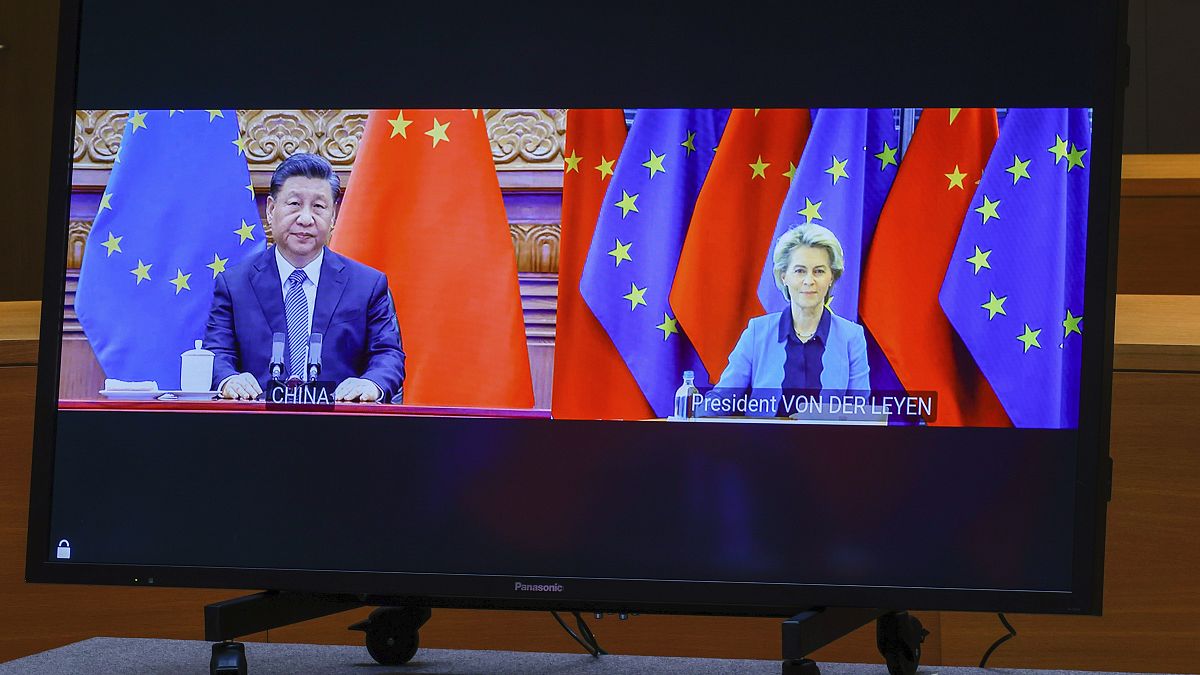EU leaders warned China of "major reputational damage" if the country helps Russia to circumvent Western sanctions.
EU leaders warned China not to support Russia's invasion of Ukraine but failed to secure a pledge of non-interference in the war.
Ensuring that China maintains a hands-off, equidistant approach to the conflict was the main goal of a virtual EU-China summit that took place on Friday.
The EU front was represented by European Commission President Ursula von der Leyen, European Council President Charles Michel and High Representative Josep Borrell. They first held talks with China’s Prime Minister Li Keqiang and later exchanged views with President Xi Jinping.
Russia's invasion of Ukraine, now in its second month, was the main topic on the agenda.
The West fears that a potential intervention from Beijing in favour of Moscow would mark a turning point in the war's evolution and offer the Kremlin a much-needed boost to re-energise its stalled military campaign.
China has played a deliberately ambiguous role in the invasion from the very beginning, expressing support for Ukraine's independence while condemning Western sanctions against Russia.
"We made it very clear that China should, if not support, at least not interfere with our sanctions," said von der Leyen at the end of the meeting.
"No European citizen would understand any support to Russia’s ability to wage war. Moreover, it would lead to a major reputational damage for China here in Europe."
The two presidents emphasised China's status as a permanent member of the United Nations Security Council and its responsibility to uphold international law and protect Ukraine's sovereignty.
They also used China's profitable economic ties with the EU – and the comparably negligible links with Russia – and the instability injected in the global economy as reasons to refrain from supporting the Kremlin.
"We called on China to help end the war," said Michel, speaking next to von der Leyen. "We hope these arguments have been heard."
During the press conference that followed the virtual summit, journalists repeatedly pressed the two presidents to find out if they had obtained any sort of assurance that China will not intervene in the conflict and lend Russia a helping hand.
The evasive responses from both von der Leyen and Michel quickly revealed that such guarantee had not been extracted, keeping China's stance as a matter of guesswork.
"We explained the European position and what it means to have such a war on European soil. We know in China the focus is much more on Omicron and the complete lockdowns they have," said von der Leyen, who described the summit's atmosphere as "very sober" and the dialogue as "very open and frank."
"Equidistance is not enough."
According to a read-out published by the Chinese Ministry of Foreign Affairs, President Xi underlined that China finds the conflict "deeply regrettable" and said it "must be handled properly."
"One should not take the wrong medicine, or focus on just one aspect of the issue without regard to the rest, or hold the entire world hostage, still less make ordinary people around the world suffer as a result. The more critical the situation, the greater the need to stay level-headed," the ministry wrote, without ever using the words "war" or "invasion" to refer to the situation.
China also expressed support for the EU's efforts to find a "political settlement" to the war and foster "lasting peace" across the continent.
"The root cause of the Ukraine crisis is the regional security tensions in Europe that have built up over the years. A fundamental solution is to accommodate the legitimate security concerns of all relevant parties," the readout said.
"In this day and age, global and regional security frameworks should no longer be built with a Cold War mentality."
Besides Ukraine, the agenda included other topics that have caused significant friction between the two sides in recent years, such as trade barriers for EU companies that operate in the Chinese market, human rights abuses in the Xingjian region and Beijing's sanctions against Members of the European Parliament.
"Having a dialogue with someone doesn't mean you're blind or deaf," said Michel.
The EU side also raised the subject of economic coercion against Lithuania, which the Chinese read-out did not mention.
The Baltic state claims China is punishing the country for allowing Taiwan, the self-governing island that Beijing sees as a breakaway province, to open a de-facto embassy in Vilnius.
The European Commission has collected evidence that suggests China is refusing to clear Lithuanian goods through its customs system, rejecting import applications and pressuring EU companies to remove Lithuania-made components from their supply chains.
China has denied such systematic policy exists, but the justification has not been enough for the executive, which earlier this year decided to launch a legal case before the World Trade Organization (WTO).
In a sign of the current tensions plaguing EU-China relations, the summit did not produce a joint statement. But EU leaders insisted they had sent Beijing an unmistakable message about their priorities and concerns.
"Nothing will be like it was before the war," said von der Leyen.
"It’s now a question to take a very clear stance to support and defend the rules-based order. If you have conflicts, you solve them at the negotiating table."
